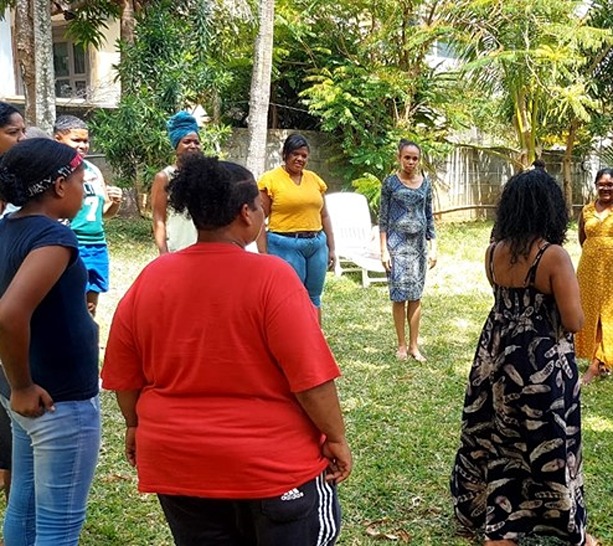QUESTIONS FOR SEAN RUNGEN, DIRECTOR OF FAMILY ACTION:
"Our goal today is to support couples and families and to promote harmony within the family."
You are today the young director of an NGO that is celebrating its 60th anniversary this year. What would you like to bring to the projects of Action Familiale?
I would like to reposition the image of Action Familiale so that it better reflects our current projects. Our original objectives – that dates back to 60 years – which addressed the initial realities of the Mauritian society, have evolved since then. Our goal today is to support couples and families and to promote harmony within the family. Thus, our approach is much broader than what we have been known for until now, which is exclusively the promotion of the natural family planning method.
We understand that this natural method of family planning is today only part of the work of promoting family harmony, which also involves harmony within the couple?
What we wish is to support couples for a harmonious family relationship and a quality parenting life. We promote the natural family planning method as a means to strengthen communication within the couple, who are meant to make major decisions together. (like family planning). Our approach is therefore much more comprehensive. We follow up the couple and talk about everything that surrounds them. We also talk about birth, breastfeeding, pregnancy, sexual understanding, misunderstandings and the physical and psychological differences between men and women.
A lot of emphasis on family values, then?
Yes, and about self-respect and respect for others, empathy, honesty, including with children, forgiveness, belonging to the family, and one's responsibilities as a parent but also as a child. We emphasize on the importance of expressing oneself, and especially expressing one's Love.
Strengthening family ties, to you, involves attending to the individual needs of the members of the family circle?
We believe that the answer to the societal problems we see today lies in the richness and harmony of the family fabric. We are thus reviewing our approach by including work on self-esteem and the autonomy of the individual, together with their financial autonomy. We are carrying out projects to support women facing family difficulties (the "Fam, Konn to Valer" project), and we collaborate with other NGOs on their entrepreneurship training programs (such as the "ITS TYME" program by Junior Achievement Mascareignes, for example)... It's about boosting the person so they can go further on their personal journey. The ultimate goal is for the couple and the family to live and live well.
You place a particular focus on women in support programs... Why?
The woman is the pillar of the family. Women who feel better and contribute to the family structure conveys a positive image as a pillar of empowerment rather than an image of dependency and passivity. This image will be a reflection of the family, and this family-reflection will bounce back onto society at large.
According to your observations, how has the family structure as it is built in Mauritian society changed over time?
Today's family is increasingly isolated from the support systems that were traditionally received from grandparents. Family ties have been severed, and the transmission of values has become more difficult. Modern parents live in a society where information comes from everywhere, which means they seek advice less from the previous generation. Children as well as parents spend much time on screens. We want to offer young parents the opportunity to create more quality time with their family, but not by being technophobic either.
To meet with this tech-savvy audience halfway, is Action Familiale keeping up with the times (of social media) at the age of sixty?
It's one of the other things I would like to do as a young person: Action Familiale is more active on social media. We aim to be more tech-friendly in our activities.
At the end of January, you wrapped up the RADO project (Support Network for Adolescents) in Vieux Grand-Port. Could you talk about the work done with the 45 children involved in the project?
RADO is a service we offer to young people aged 12-17 over 16 weekly sessions. The project consists of trainings to help them develop their skills, programs to help them increase their self-esteem, their self-image, and their responsibilities towards society... Specifically, we are talking about family values, changes in the body through physical expression activities and slam poetry; all connected to the message we have developed. It is about creating a safe space where they can ask their questions, access clear information based on scientific facts
... and presented in a language that is suitable and accessible?
Yes, in fact, every time we implemented the program in a new location, we had to adapt to the context of the new region and adjust our language. The new RADO program started in 2021 in two regions: Coteau Raffin and Henrietta. In 2022, we were in Ville Noire and Vieux Grand-Port. And this year, we are aiming for Trou d’Eau Douce. We generally roll out after fieldwork preparations in order to minimize potential barriers to the smooth running of the program. We establish connections with people on the field, train them and they are the ones who provide support to the young people in the program.
USEFUL CONTACTS:
Action Fmailiale: actogether.mu/fr/trouver-une-ong/action-familiale
Email: actionfamiliale@gmail.com
Phone: 606-1687 / 606-4560


